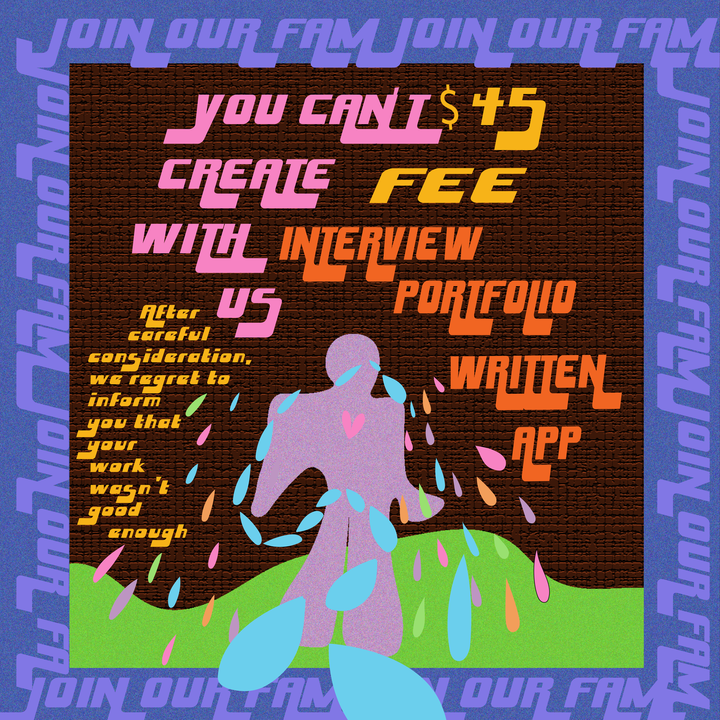THE GIRLS ARE GAGGED
USC’s ‘creative’ clubs are everything but inclusive
The structure of creative clubs is too often elitist, conformist and actively prevents creatives from being in community with one another.
The structure of creative clubs is too often elitist, conformist and actively prevents creatives from being in community with one another.


Sex! Power! Regime change! These are themes I am eager to explore in my art.
Unsurprising, since the most powerful creative projects I’ve been a part of have been ones that confront and deny traditional notions of space, time, power and play. For me, it was my English professors who allowed me to forget about the deadline for the sake of passionate writing, which taught me the importance of creativity beyond bounds. Or my mentor who pushed me to burn bridges with organizations that did me dirty — regardless of their status.
These powerful transgressions criticize and challenge normative ways of thinking — daring our spirits to imagine beyond the traditional, the corporate; the way “things have always been done.”
Through my time at USC, though, I’ve discovered that these transgressions are mere fantasy. Because time and time again, I’ve been met with a desktop full of application screens, portfolio requests and eventually deep sorrow as I was confronted with the fact that I wasn’t quite what they were looking for. It’s truly heart-wrenching to sit and think about all the recruitment efforts which have ended early for me, to mourn all the opportunities I missed to awkwardly gargle down a Capri Sun at professional mixers.
Weirdly cutthroat scrapbooking clubs are fitting for a place like USC and other competitive universities — where status and allure actively affect the opportunities you will receive. Creative communities at USC too often become concerned with Instagram branding, tote bags for sale and the $45 membership fee — which probably pays for the e-board to eat CAVA every other Sunday.
It’s nothing new, and that’s why many queer creatives often end up painting themselves into a corner, disconnected from the very spaces that claim to “value” inclusion. It seems that this “inclusion” is contingent on you having immense time and talent, not just to create, but to eat the organization’s ass throughout recruitment.
Creative clubs — whatever their focus — should stop expending their energy rejecting people for arbitrary reasons, most of which are based on social hierarchies. This culture is deprived of humanity and actively harms the spirit of creative people.
The obsession with maintaining elite clubs that exclude people who don’t meet your qualifications doesn’t lead to better projects; it leads to the same anxious, non-collaborative, competitive process, where culture and authenticity deteriorate into complicity and groupthink.
Everything becomes structural, rooted in logistics, and the opportunity to gather inspiration through different mediums and connect with others gets lost in the mandatory meetings.
While holding space for frustrations, queer people — and students who feel disadvantaged when applying to clubs with barriers to entry — shouldn’t automatically shun themselves away from these mismanaged clubs with oppressive hetero-normative cultures. We must interject and disrupt them, challenging traditional power structures through our creative work. At the same time, we should actively seek to find and create spaces which evade power dynamics, looping people in who might be interested; a club with a real purpose has no need for exclusivity.
Let’s remember: No matter how jarring each time, the entitlement isn’t new, and this isn’t our first rodeo. The corporate behemoths who run industries like film and design have always displaced small artists and businesses by owning means of production and commodifying certain — often extractive — modalities of art over others.
Creatives struggling to find inclusion or connection in these organizations should remember that these organizations, by way of design, are often set up to exclude us and our ideas. We should keep note of this reality through each step of our trajectory, along with reminding ourselves that just because we don’t align with these models doesn’t mean we don’t deserve access to resources found in them.
More importantly, we should ground ourselves in the power of claiming an idea formed in community, in the natural rivets of connection. Students struggling to find inclusion in creative spaces should look to the spaces where they do feel included. For me, the LGBTQ+ Student Center is an inspiring place to create — since it’s a community space, with camaraderie and a peaceful atmosphere.
At the end of the day, everyone’s relationship with their creative identity is theirs to define. That said, we shouldn’t have to perform top-notch fellatio on an organization that will inevitably extort our labor.
Unnecessarily competitive college clubs are rising throughout universities and it’s time we actively resist any club cultures that rely on power, status or skill. It’s crucial for us to use our identity as artists to create more expansive communities — ones which embrace difference with breadth and movement.
So get fuckin’, girlies! And don’t forget to paint the experience after!
Arjun Bhargava is a junior inciting discourse on pop, sex, power and art. Their column, “The Girls are Gagged,” runs every other Friday.
We are the only independent newspaper here at USC, run at every level by students. That means we aren’t tied down by any other interests but those of readers like you: the students, faculty, staff and South Central residents that together make up the USC community.
Independence is a double-edged sword: We have a unique lens into the University’s actions and policies, and can hold powerful figures accountable when others cannot. But that also means our budget is severely limited. We’re already spread thin as we compensate the writers, photographers, artists, designers and editors whose incredible work you see in our daily paper; as we work to revamp and expand our digital presence, we now have additional staff making podcasts, videos, webpages, our first ever magazine and social media content, who are at risk of being unable to receive the compensation they deserve.
We are therefore indebted to readers like you, who, by supporting us, help keep our paper daily (we are the only remaining college paper on the West Coast that prints every single weekday), independent, free and widely accessible.
Please consider supporting us. Even $1 goes a long way in supporting our work; if you are able, you can also support us with monthly, or even annual, donations. Thank you.
This site uses cookies. By continuing to browse the site, you are agreeing to our use of cookies.
Accept settingsDo Not AcceptWe may request cookies to be set on your device. We use cookies to let us know when you visit our websites, how you interact with us, to enrich your user experience, and to customize your relationship with our website.
Click on the different category headings to find out more. You can also change some of your preferences. Note that blocking some types of cookies may impact your experience on our websites and the services we are able to offer.
These cookies are strictly necessary to provide you with services available through our website and to use some of its features.
Because these cookies are strictly necessary to deliver the website, refusing them will have impact how our site functions. You always can block or delete cookies by changing your browser settings and force blocking all cookies on this website. But this will always prompt you to accept/refuse cookies when revisiting our site.
We fully respect if you want to refuse cookies but to avoid asking you again and again kindly allow us to store a cookie for that. You are free to opt out any time or opt in for other cookies to get a better experience. If you refuse cookies we will remove all set cookies in our domain.
We provide you with a list of stored cookies on your computer in our domain so you can check what we stored. Due to security reasons we are not able to show or modify cookies from other domains. You can check these in your browser security settings.
These cookies collect information that is used either in aggregate form to help us understand how our website is being used or how effective our marketing campaigns are, or to help us customize our website and application for you in order to enhance your experience.
If you do not want that we track your visit to our site you can disable tracking in your browser here:
We also use different external services like Google Webfonts, Google Maps, and external Video providers. Since these providers may collect personal data like your IP address we allow you to block them here. Please be aware that this might heavily reduce the functionality and appearance of our site. Changes will take effect once you reload the page.
Google Webfont Settings:
Google Map Settings:
Google reCaptcha Settings:
Vimeo and Youtube video embeds:
The following cookies are also needed - You can choose if you want to allow them:
